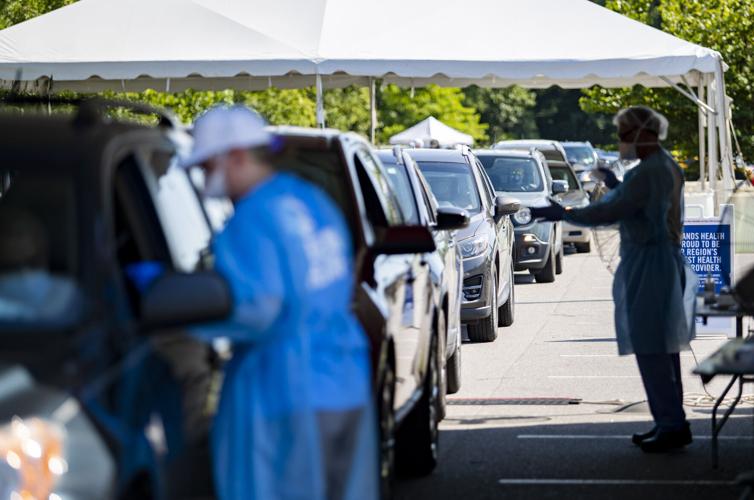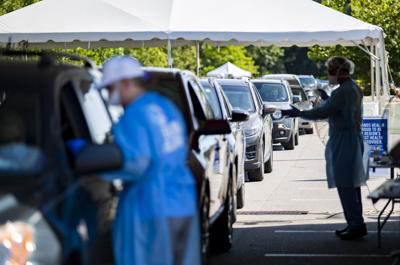A lot is still unknown about the coronavirus, and South Carolina researchers are asking for the public's help with determining the long-term effects of surviving the virus in a new study.
"Some people go through COVID like nothing ... others are not so lucky," said Julius Fridriksson, a public health professor with the University of South Carolina and the lead investigator on the study.
USC's Aging Brain Cohort is looking to survey residents diagnosed with COVID-19 to study and better determine what impact coronavirus has on brain health once a person recovers from the disease.
One of the team's big motivators for wanting to do the study was seeing people report a loss of mental clarity after recovering from the coronavirus, Fridriksson said. Anecdotally, they've seen patients disclose dealing with brain fog and a continued loss of smell or taste after they tested positive for COVID-19.

Julius Fridriksson is a public health professor with the University of South Carolina and the lead investigator in a new study on the potential brain health effects of coronavirus. Provided
Fridriksson knows a man who was diagnosed with COVID-19 in March and still doesn't have any sense of smell.
Sarah Newman-Norlund, a cognitive research specialist with the USC project, said initial reports out of China earlier this year also have affirmed the possibility of a negative brain health impact from the coronavirus.
In a study by the Journal of the American Medical Association of 214 coronavirus patients in China, 36.4 percent had neurological symptoms, including issues with maintaining consciousness and muscle injury. Patients with severe infections were more likely to have those symptoms.
Newman-Norlund said with research, studies like this need to be repeated across different medical systems, cultures and settings. This is why they argue that their new project is necessary.
“We can really learn more about who and what group of people it is affecting," she said.

Sarah Newman-Norlund is a cognitive research specialist with USC Aging Brain Cohort. Provided
The cohort, in partnership with Palmetto Health USC, is calling for anyone who has tested positive for COVID-19, recovered for 28 days and is between the ages of 20-80 to be a part of the project. The study will consist of surveys, brain tests and MRI scans. Residents can visit the website abc.sc.edu for more information about getting involved.
Sara Sayers, a speech pathology expert and USC research associate, said they chose the 20-80 age range for two reasons. The first is to match their previous research and the second is to avoid the developing brain activity that is seen with people younger than 20. The brain is still forming and shaping under the age of 20.
Prior to the pandemic, USC was already collecting a massive amount of data from people in the 20-80 age range to learn more about the activity of the aging brain. Because of this data collection, they now have a control group to compare to the new COVID-19 patients.
“We’re in an awesome spot to actually look at this," Sayers said.
The team recently completed a study of the effect of isolation on the elderly during the pandemic. Six months prior to COVID-19 cases emerging in March, the cohort surveyed residents between ages 60 and 80. They followed up with those same patients this summer.

Sara Sayers is a speech pathology expert and a research associate with USC's Aging Brain Cohort. Provided
While that study is still being reviewed by other researchers, Sayers said that they did see changes in social and emotional health in that group.
But one of the main concerns with experts is that there is still not enough information on the potential long-term effects of COVID-19.
Dr. Jacobo Mintzer, executive director of the Roper St. Francis Research and Innovation Center, works with Alzheimer's research.
He said working with and surveying patients with conditions like dementia during the pandemic is vital because any negative COVID-19 effects on the conditions need to be discovered.
“We don’t know, we need to collect information," he said.
The USC study is open to all adults who have tested positive for the coronavirus. This also will allow them to highlight the impact on people with preexisting mental health conditions such as PTSD and dementia.
The goal is to complete the new brain health study in the next six months. The hope is that the results will help researchers note any patterns to help with advice on coronavirus treatments.
Newman-Norlund said they could potentially see if a loss in smell and taste has something to do with the coronavirus attacking a certain part of the brain. If there's a pattern with taking a certain medication or being on a ventilator, they could pinpoint that as well.
Fridriksson said ultimately they hope to just give the public more insight on what being diagnosed with virus involves.
“Those individuals who recovered from COVID don't know what the future holds for them," he said.













